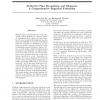88 search results - page 3 / 18 » Assessing the Complexity of Plan Recognition |
COLING
1992
13 years 7 months ago
1992
This paper presents a plan-based model of dialogue that combines world, linguistic, and contextual knowledge in order to recognize complex communicative actions such as expressing...
TITS
2011
13 years 21 days ago
2011
—Due to modern pervasive wireless technologies and high-performance monitoring systems, spatio-temporal information plays an important role in areas such as intelligent transport...
KR
1992
Springer
13 years 9 months ago
1992
Springer
While it has been realized for quite some time within AI that abduction is a general model of explanation for a variety of tasks, there have been no empirical investigations into ...
AROBOTS
2008
13 years 4 months ago
2008
Abstract Many elderly and physically impaired people experience difficulties when maneuvering a powered wheelchair. In order to provide improved maneuvering, powered wheelchairs ha...
KI
2009
Springer
14 years 9 days ago
2009
Springer
Today’s complex production systems allow to simultaneously build different products following individual production plans. Such plans may fail due to component faults or unfores...

